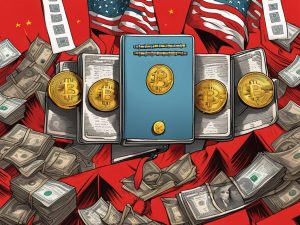The Dubai International Financial Centre (DIFC) Introduces New Digital Assets Law
The Dubai International Financial Centre (DIFC), a tax-free special economic zone in the United Arab Emirates city, recently announced the enactment of its new Digital Assets Law. This move is accompanied by a new Law of Security and related amendments to existing legislation. The aim of these enactments is to keep pace with technological developments in international trade and financial markets and provide legal clarity for investors and users of digital assets.
The DIFC’s Digital Assets Law was developed after reviewing the regulatory approaches taken by various jurisdictions around the world and conducting a period of public consultation last year. It officially came into effect on March 8, 2021.
The DIFC is an organization that promotes financial services and attracts international investment. It operates with its own legal system and courts based on English common law, separate from the wider UAE.
DIFC Chief Legal Officer Jacques Visser described this legislation as groundbreaking, as it is the first legislative enactment to comprehensively define the legal characteristics of digital assets as a matter of property law. It also provides guidance on how digital assets can be controlled, transferred, and dealt with by interested parties.
Market participants have expressed optimism about the DIFC’s modernization efforts:
The Benefits of the DIFC’s Digital Assets Law
- The DIFC’s move to modernize its property and securities laws for blockchain capabilities could support growth in digital asset and tokenization initiatives by attracting market participants to the free zone.
- By providing legal clarity, the DIFC’s Digital Assets Law may encourage increased investor confidence in digital assets, leading to greater adoption and participation in this emerging market.
- The enactment of this law demonstrates the DIFC’s commitment to staying at the forefront of technological advancements and fostering a favorable environment for innovation in the financial sector.
The Significance of the DIFC’s Legal Approach
The DIFC’s approach to digital assets is significant for several reasons:
Comprehensive Definition of Digital Assets
Unlike many jurisdictions that have struggled to define digital assets, the DIFC’s Digital Assets Law sets out clear legal characteristics of these assets as a matter of property law. This clarity benefits investors and users who can now operate within a well-defined legal framework.
Control, Transfer, and Dealing with Digital Assets
The DIFC’s legislation also addresses how digital assets can be controlled, transferred, and dealt with by interested parties. This guidance ensures that transactions involving digital assets can be executed securely and efficiently.
Alignment with International Best Practices
The DIFC’s review of regulatory approaches from around the world indicates a commitment to aligning its laws with international best practices. This approach helps attract global market participants seeking a jurisdiction with a robust legal framework for digital asset activities.
Conclusion: A Positive Step Towards Digital Asset Adoption
The introduction of the DIFC’s Digital Assets Law is a positive step towards fostering an environment conducive to digital asset adoption. By providing legal clarity and modernizing its property and securities laws, the DIFC aims to attract market participants and encourage growth in digital asset and tokenization initiatives within its free zone.
Hot Take: The Dubai International Financial Centre (DIFC) Paves the Way for Digital Asset Innovation 🚀
The enactment of the new Digital Assets Law by the Dubai International Financial Centre (DIFC) marks a significant milestone in the advancement of digital asset innovation. By taking proactive steps to keep pace with technological developments and provide legal clarity, the DIFC demonstrates its commitment to fostering a favorable environment for digital assets.
The comprehensive definition of digital assets and guidance on their control, transfer, and dealing within the DIFC’s legal framework provide much-needed certainty for investors and users. This clarity is likely to boost investor confidence and drive greater participation in the digital asset market.
Furthermore, the DIFC’s alignment with international best practices positions it as an attractive jurisdiction for global market participants seeking a secure and well-regulated environment for their digital asset activities.
The introduction of the Digital Assets Law sets a positive precedent for other jurisdictions to follow, encouraging global adoption and innovation in the field of digital assets. As the digital asset landscape continues to evolve, the DIFC’s forward-thinking approach positions it as a key player in this transformative industry.





 By
By
 By
By

 By
By
 By
By
 By
By